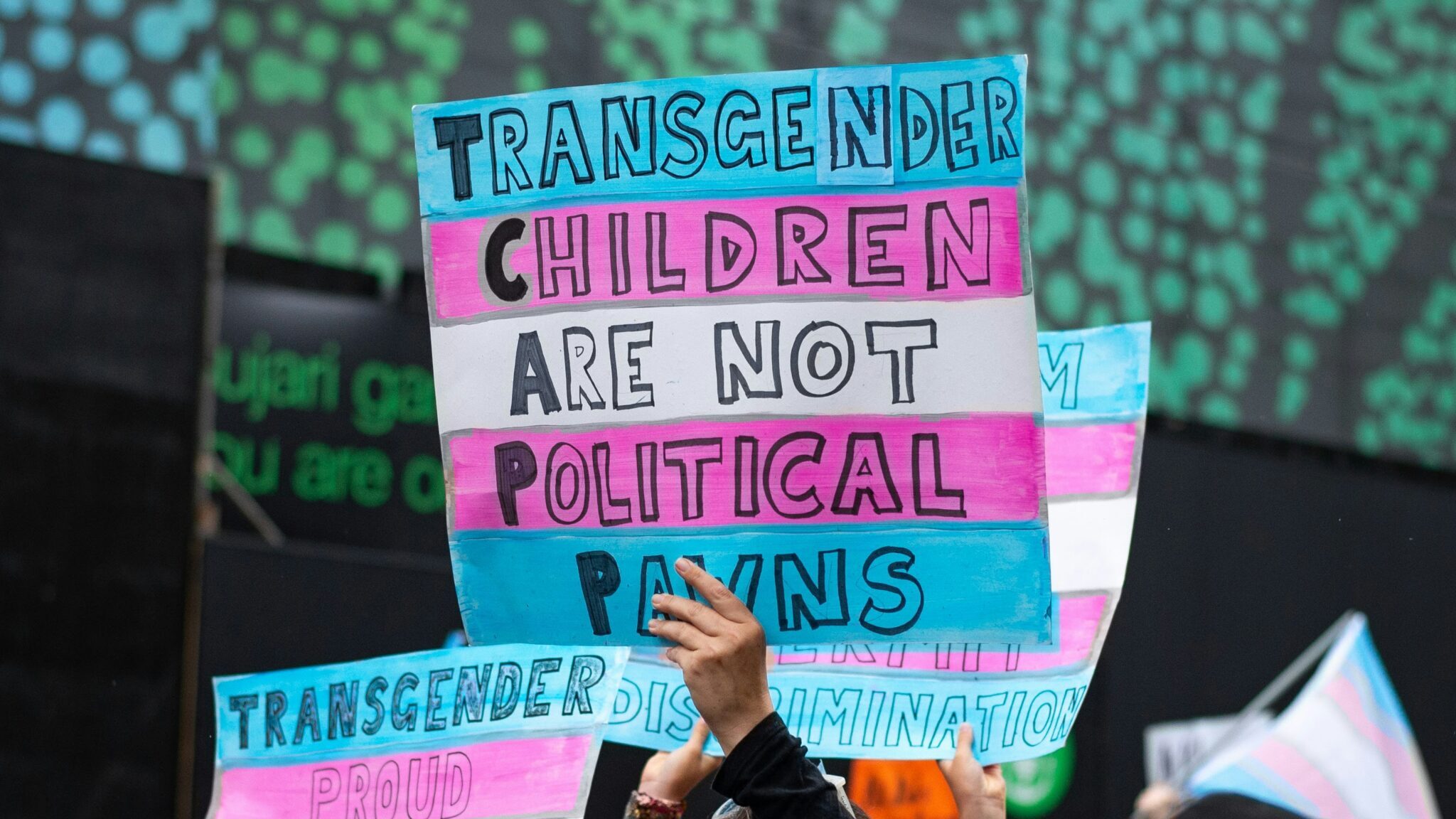The highest ranking transgender official in U.S. history will give a speech in Texas Saturday, urging physicians-in-training to fight political attacks against young trans people and their families.
Adm. Rachel Levine, the U.S. assistant secretary for health, will make a speech in Fort Worth at the Out For Health Conference at Texas Christian University.
In prepared remarks shared exclusively with NPR, she writes: “Trans youth in particular are being hounded in public and driven to deaths of despair at an alarming rate. Fifty-two percent of all transgender and nonbinary young people in the U.S. seriously contemplated killing themselves in 2020. Think about how many of them thought it was better to die than to put up with any more harassment, scapegoating and intentional abuse.”
Political attacks against trans young people are on the rise across the country. Over 100 anti-trans bills have been introduced in state houses this year, according to an analysis by Freedom for All Americans and the Guardian. Many of these legislative attacks use scientific language to justify their political aims, she says. In her prepared remarks, she concludes: “The language of medicine and science is being used to drive people to suicide.”
Levine is a pediatrician and adolescent medicine specialist by training. “I’m not a political person,” she tells NPR. But in this context, she says, when young trans people are being attacked by their own governments, she thinks medical professionals “need to stand up and be more vocal — and that’s exactly what I’m going to do.”
NPR spoke to Levine before she flew to Texas about what many Americans still don’t understand about sex and gender, how federal policy can counterbalance anti-trans legislation in the states, and how she sublimates personal attacks to drive her advocacy.
This interview has been edited and condensed for length and clarity.
You will be speaking at Texas Christian University on Saturday at the Out For Health Conference, which was founded and organized by medical students. Why this event and what is the message of your speech?
I think it’s a tremendous opportunity to speak with young professionals about health equity, diversity and inclusion.
One of the biggest messages I have at this time is really to speak about the challenges that the LGBTQI+ community face, particularly youth. The challenges come from very disturbing – and frankly discriminatory – laws and actions that many states are taking that are potentially dangerous, and costing the lives of young people. I think it’s a very important message to give young physicians in training.
In your prepared remarks, you write, “Anyone who believes that words are not the same as actions, who believe that LGBTQI people should just toughen up, should walk a mile in our shoes.” What would people learn from walking a mile in your shoes?
For some people, I think that these issues of gender identity are beyond their experience. They don’t understand it, and so they fear it, and that fear can lead to negative feelings and emotions. My goal is to educate about the LGBTQ+ community in general, and to educate about the trans community – that we are people just like everyone else.
We are doctors, we are lawyers, we are business people, we are teachers, we function in every part of society and we’re all just doing our part and living our lives and working towards the common good. And that might help dispel some of this fear and some of this discrimination.
“To walk in our shoes” is to have empathy for other people. I am such a big fan of diversity in all of its different aspects. I think diversity helps society. It helps any community. It helps any business, school, governmental agency. We have this beautiful tapestry of diversity in the United States. And so I think that it really is incumbent upon us to have empathy and compassion for those that are different from us.
Pew did a survey in 2021 that found that most Americans think that whether someone is a man or woman is fixed at birth. Most Americans also say they don’t know anyone who is trans. There’s a gap of understanding. Is there a role for the federal government in closing that gap?
I think there’s a role for community, medical and public health organizations to educate the public about these issues.
[Most people’s] experience might be that there is a simple binary of male and female, but it is actually much more complicated.
There is sex. You might think that that is simple, but it is not. There’s chromosomal sex, there are [primary] sex characteristics, secondary sexual characteristics. Of course, there are individuals as part of our LGBTQ+ community who are intersex. And so it is multi-dimensional.
Then there’s gender. Gender is really that self-concept in terms of your gender that is also multidimensional. There are sex roles, which have changed tremendously in our society over the last 50 to 70 years. And then there’s sexual orientation – whom one is attracted to and wants to have intimate relations with – and that is also multidimensional. We want to educate people about those somewhat complex features and help them understand our rainbow family.
Texas has been one of the loudest states in going after trans kids and families. The state has investigated the parents of trans kids for child abuse. Families have moved out of the state because they felt unsafe, and the state attorney general attacked you recently on Twitter. As a trans person, how are you thinking of all that as you head to Texas?
I use all of those challenges and sublimate that into my work. Those egregious actions, one might say insidious actions, that are politically motivated and really harm trans and gender-diverse youth and their families – I take my feelings about that and I put it into my advocacy and our policy work to support trans youth and their families.
We have a president, President Biden, who sees us and supports us. We have a vice president, Vice President Harris, who sees us and supports us. Secretary Becerra of the Department of Health and Human Services, Secretary Cardona of the Department of Education – really across the administration in the federal government, it is just remarkable how supportive they are to the LGBTQ+ community.
But we are seeing in many states – including Texas – laws and actions which are discriminatory, politically motivated and they need to be fought against.
How?
So, for example, [the federal HHS] Office for Civil Rights has issued a formal interpretation of Section 1557 of the Affordable Care Act, where it says you cannot discriminate on the basis of sex, and that includes sexual orientation and gender identity.
People who feel that they are being discriminated against can contact the Office for Civil Rights, and they will open a case and investigate. And so we encourage trans and gender-diverse youth and their families [who] are feeling they are being discriminated against in Texas or any other state [to] contact our office.
In addition, [federal agencies] are looking at Title IX – particularly in the Department of Education and the Department of Health – in terms of support for sexual and gender minorities. We are going to be looking – throughout the administration – at policies that, again, support, affirm and empower our community.
Prior to this role, you were the secretary of health in Pennsylvania. A lot of people might not realize that you in HHS are not in charge of, say, the Florida Department of Health. That’s not how it works. Do you think that is a problem in the case of trans youth?
We have a republic in which the states have a lot of individual power. One thing we learned through the pandemic is how important it is to coordinate between local, state and federal public health authorities. When they’re not coordinated, that makes our work very difficult.
These negative and discriminatory actions and laws are politically based. It’s not public health-based. It’s not medically based in any way.
[In medicine], there is an evidence-based standard of care for the evaluation and treatment of trans individuals, whether they’re youth or adults. That standard is set by the World Professional Association for Transgender Health, or WPATH. The last formal standards of care were [released] in 2011, and we expect the new standards of care in 2022.
There are many other standards set by organized medicine, for example, the Endocrine Society, which is an international organization of hormone specialists – endocrinologists – has a standard of care. There have been comments from the American Academy of Pediatrics, the Society for Adolescent Health and Medicine, from the [American Medical Association], from the American Psychiatric Association, the American Psychological Association – [all] in support of evidence-based standards of care for [gender-affirming] treatment.
So when, for example, the surgeon general of Florida puts out a statement based upon political considerations, that is not appropriate. We need to stand against that both from a medical and public health point of view.
As you mentioned, the Florida Department of Health published a fact sheet last week about trans health and cited many studies (although many groups have refuted its claims). When your office in March published a fact sheet, it also cited many studies. Where is the research on this? Is there a dispute?
I will disagree that there are many studies cited in the Florida statement – there are a few studies. I’ve looked at them. A lot of them say that we need more research. We agree. This is no different from any other medical field in which there’s a research base that might inform a standard of care for treatment of other conditions, whether that’s diabetes or hypothyroidism or other hormonal endocrine conditions – those change over time as the research changes.
When you look at the forthcoming WPATH standards of care and you see the hundreds and hundreds of articles, you will be able to see the difference between the research base for the standards of care and the few studies cited by Florida.
There is no argument among medical professionals – pediatricians, pediatric endocrinologists, adolescent medicine physicians, adolescent psychiatrists, psychologists, etc. – about the value and the importance of gender-affirming care.
Idaho, Alabama, Arizona and other states have introduced more than 100 bills related to trans kids this year. There are bills about what can be taught in schools related to sexuality and gender – the so-called “Don’t Say Gay” bills. Some limit gender-affirming treatment to young trans people. Others limit trans kids’ participation in sports. What do you think is happening in these states with all of these bills?
I think that they’re all related in terms of their political motivation, and trying to stigmatize a vulnerable community — and particularly to stigmatize LGBTQ+ youth. We have a mental health crisis in this country, particularly among our young people, with increasing rates of depression, anxiety, suicidal thoughts, suicidal behavior. Our surgeon general, Vice Admiral Vivek Murthy, highlighted that in a surgeon general’s advisory in December of 2021.
One of the most vulnerable groups of young people are LGBTQI+ youth, and particularly – the focus of many of these issues – trans youth. We need to affirm them. We need to empower them because they are at risk, and they have a very high rate of suicidal thought and we have to act to prevent them from harming themselves. [We have] to support those young people and their families.
You said on a podcast recently that “being trans doesn’t have to define who I am.” I’ve heard from trans friends and colleagues that it can be exhausting to have to explain your personal experience and talk about gender all the time. How do you think about this part of your job and your role?
I am honored to be the assistant secretary for health, and a four star admiral and the leader of the United States Public Health Service Commissioned Corps. I recognize that I am the first openly transgender person to be confirmed by the Senate and to have these roles. It is a privilege. I want to use that – how fortunate I am to be in these roles – to work toward the common good in all of the different medical and public health issues that we’ve been discussing and more.
I understand the significance of my role to stand up and be counted as a very open and proud LGBTQ+ individual and openly transgender woman. And to use that to support more of our vulnerable LGBTQ+ community in all ways that I can.
[Talking about it] doesn’t bother me. I mean, I’ve been in these [public] positions for seven, eight years now, and so it doesn’t surprise me. I’m used to it.
This post originally appeared in NPR







